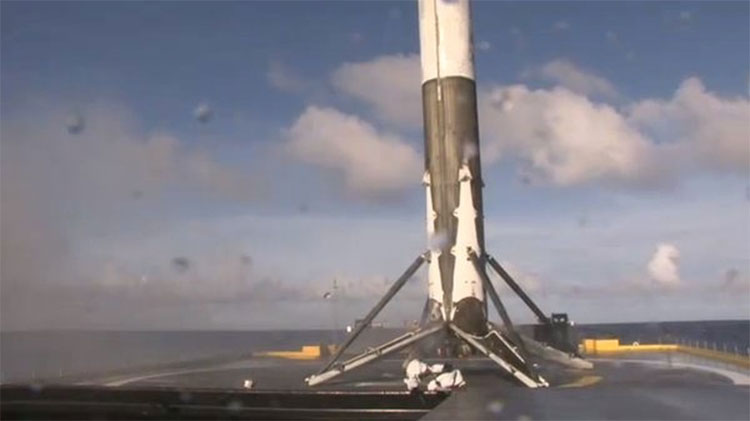SpaceX for the fourth time 'landed' successfully the Falcon boosters 9
In the morning of May 28 (Vietnam time), Falcon 9 boosters, SpaceX Space Exploration Technology Corporation - USA, successfully landed on the platform to welcome the Atlantic Ocean, after completing the mission of launching a telecommunications satellite orbits.
This is the fourth time SpaceX's Falcon 9 missile has successfully landed at sea.
According to SpaceX's announcement, the Falcon 9 rocket was launched at 17:40 on May 27 (local time), from Cape Canaveral Air Force Base, Florida State, USA.
After 10 minutes of leaving the launch pad, the first floor of Falcon 9 split off and landed directly on the pedestal on an unmanned offshore vessel 680km from Florida.

Falcon 9 boosters successfully hit the welcome pedestal.(Source: SpaceX).
SpaceX chief executive, Elon Musk, said the rocket's landing speed is close to the maximum design, the landing is still not very stable and there is still a risk of tilting.
In this mission, Falcon 9 successfully launched the Thaicom 8 satellite , weighing 3 tons, built by Orbital ATK. This satellite will provide television and data information services for South Asia and Southeast Asia for 15 years.
This is the second time SpaceX's missiles have successfully landed after launching the satellite, a step ahead of the resupply mission for the International Space Station (ISS) due to the satellite's orbit farther than ISS.
This marine landing of the Falcon 9 marks the next success of California state-owned SapceX technology, in its reuse missile test, to help save costs.
Earlier, SpaceX had successfully landed Falcon 9 on the sea on April 9 and May 6. In December 2015, SpaceX also succeeded in landing missiles on the pedestal after putting satellites into space, but that was the ground landing at Cape Canaveral base.
SpaceX was founded in 2002, owned by Internet billionaire Elon Musk. SpaceX's successful cargo test flight in May marked the first time a private corporation's spacecraft entered the ISS Station.
- SpaceX first successfully landed the Falcon 9 boosters at sea
- SpaceX continues to successfully launch Falcon 9 missiles
- SpaceX successfully landed the Falcon 9 boosters at sea
- SpaceX launches and successfully recovers Falcon boosters 9
- SpaceX successfully landed the Falcon 9 rocket, the turning point of the aerospace industry
- SpaceX's boosters fell into the sea during a supply flight to ISS
- Leaving the morning of February 26, SpaceX launched the Falcon 9 rocket and landed on Earth
- Elon Musk 'reuse' boosters explode when landing
- SpaceX successfully launched Falcon 9 missiles
- Things you don't know about SpaceX
- Video: SpaceX's failed ground-boosters
- SpaceX for the 50th time successfully launched the Falcon 9 rocket on Earth's orbit
 Van Allen's belt and evidence that the Apollo 11 mission to the Moon was myth
Van Allen's belt and evidence that the Apollo 11 mission to the Moon was myth The levels of civilization in the universe (Kardashev scale)
The levels of civilization in the universe (Kardashev scale) Today Mars, the sun and the Earth are aligned
Today Mars, the sun and the Earth are aligned The Amazon owner announced a secret plan to build a space base for thousands of people
The Amazon owner announced a secret plan to build a space base for thousands of people